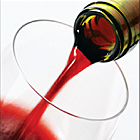- Messages
- 4,157
- Reaction score
- 1,831
- Points
- 113
 Prebiotic compounds are nondigestible substances with a beneficial physiological effect, selectively stimulating the favorable activity of beneficial bacteria within the gastrointestinal tract. Spanish researchers have found that red wine polyphenols increase beneficial bacteria, including strains of Bifidobacterium, Enterococcus, Prevotella, and Bacteroides.
Prebiotic compounds are nondigestible substances with a beneficial physiological effect, selectively stimulating the favorable activity of beneficial bacteria within the gastrointestinal tract. Spanish researchers have found that red wine polyphenols increase beneficial bacteria, including strains of Bifidobacterium, Enterococcus, Prevotella, and Bacteroides.Maria Isabel Queipo-Ortuno, from the Laboratorio de Investigaciones Biomedicas del Hospital Virgen de la Victoria, and colleagues studied 10 healthy male subjects who went through four phases of a crossover intervention study. They first engaged in a washout period, during which they avoided all alcohol and red wine for 15 days. The participants then drank either de-alcoholized red wine (272 milliliters per day), red wine (272 milliliters per day) or gin (100 milliliters per day) for 20 days each. Fecal samples were taken at each phase.
The researchers observed that the two red wine groups produced the greatest increase in the diversity of Bifidobacterium, Enterococcus, Prevotella and Bacteroides. Gin resulted in increases only in Bacteroides and Clostridium, and disappearance of Prevotella. In addition, the red wine groups showed decreases in total cholesterol and high-density lipoprotein, the so-called cholesterol, as well as a decline in C-reactive protein, an established marker of inflammation.
The authors conclude, “This study showed that red wine consumption can significantly modulate the growth of select gut microbiota in humans, which suggests possible prebiotic benefits associated with the inclusion of red wine polyphenols in the diet.“
Isabel, M., et al. Influence of red wine polyphenols and ethanol on the gut microbiota ecology and biochemical biomarkers. Am J Clin Nutr. 95(6):1323-1334.
—Dr. Bob Goldman

